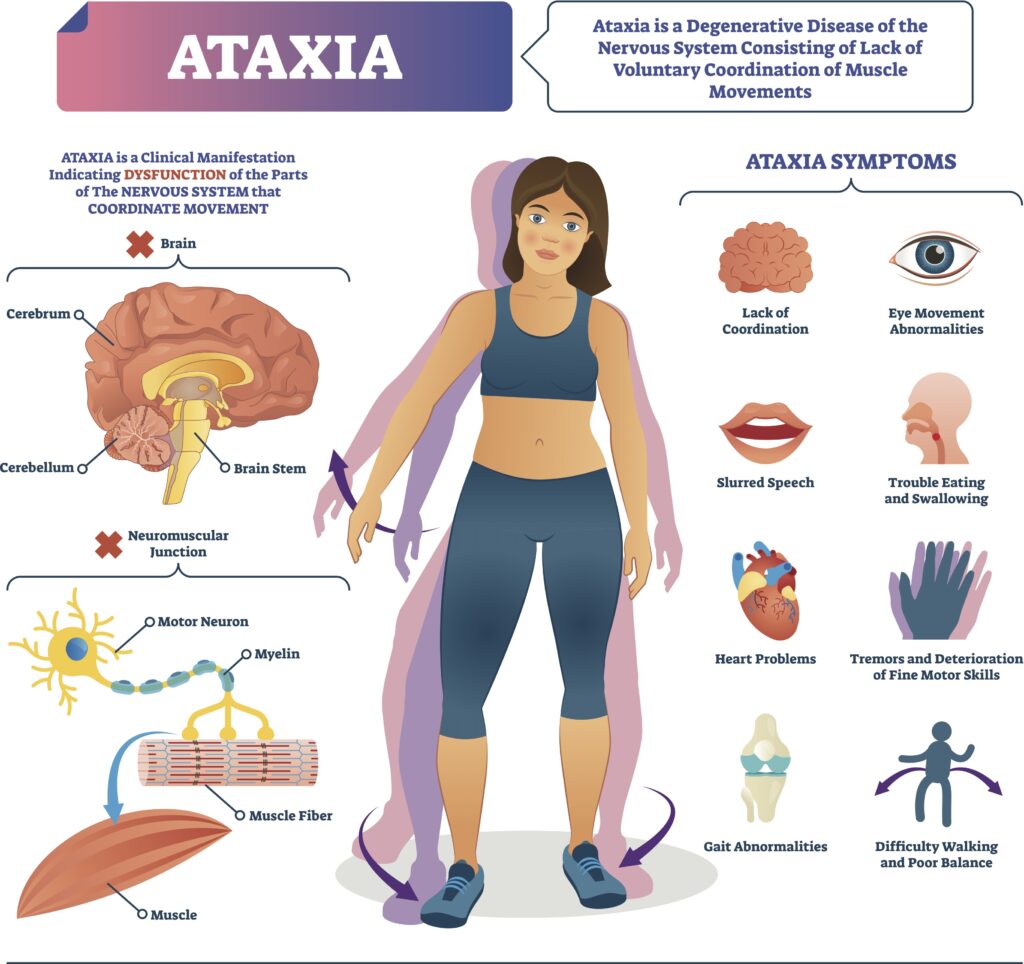What Is a Movement Disorder?
A movement disorder is a group of neurological conditions that cause abnormal voluntary or involuntary movements. These movements can be too much (excessive or uncontrolled) or too little (slowed or limited), and they are caused by dysfunction in the areas of the brain that control movement — primarily the basal ganglia, cerebellum, and motor cortex.
Types of Movement Disorders
Movement disorders are generally classified into two main categories:
1. Hyperkinetic (Excess Movement)
These disorders involve involuntary or excessive movements, including:
- Tremor – rhythmic shaking (e.g., hands, head, or voice)
- Dystonia – abnormal, sustained muscle contractions causing twisting
- Chorea – brief, jerky, unpredictable movements
- Tics – repetitive, sudden movements or sounds (as in Tourette Syndrome)
- Myoclonus – sudden, brief muscle jerks
- Dyskinesia – uncontrolled movements, often caused by medication
2. Hypokinetic (Reduced Movement)
These disorders involve slowed or reduced movement, such as:
- Parkinson’s Disease – slow movements, stiffness, tremors, balance issues
- Bradykinesia – slowness in initiating and performing movements
- Rigidity – muscle stiffness and resistance to movement
Common Movement Disorders
Here are some of the most well-known conditions:
| Condition | Symptoms |
| Parkinson’s Disease | Tremor, rigidity, bradykinesia, balance problems |
| Essential Tremor | Involuntary shaking, especially during activity |
| Dystonia | Twisting, repetitive movements or abnormal postures |
| Tourette Syndrome | Tics, including blinking, throat clearing, or sudden movements |
| Huntington’s Disease | Inherited disorder with chorea, mood changes, and cognitive decline |
| Ataxia | Poor coordination, imbalance, slurred speech |
| Tardive Dyskinesia | Involuntary movements often caused by long-term medication use |
Causes of Movement Disorders
Movement disorders can be caused by:
- Genetic factors
- Neurodegenerative diseases
- Brain injuries
- Infections (e.g., encephalitis)
- Medication side effects
- Metabolic or autoimmune conditions
When to See a Specialist
If you or someone you know has symptoms like:
- Constant shaking or tremors
- Muscle stiffness or slowness
- Uncontrolled facial movements or vocal tics
- Difficulty walking or maintaining balance
…you should consult a movement disorder specialist (neurologist) for a proper diagnosis and treatment plan.
Are you or your loved one experiencing tremors, stiffness, involuntary movements, or difficulty walking? These could be signs of a neurological condition known as a movement disorder. Early diagnosis and expert care are crucial – and that’s where a movement disorder specialist near you comes in.
At Ali Group Services, we make it easier than ever to connect with top-rated movement disorder specialists in your area through our online doctor appointment booking platform. No long wait times, no confusing processes – just fast, reliable access to quality care.
What is a Movement Disorder Specialist?
A movement disorder specialist is a neurologist with advanced training in conditions that affect the ability to control body movements. These specialists diagnose and treat a wide range of conditions, including:
- Parkinson’s Disease
- Essential Tremor
- Dystonia
- Tourette Syndrome
- Ataxia
- Tardive Dyskinesia
- Huntington’s Disease
- Restless Leg Syndrome
If you’ve been searching for a “movement disorder specialist near me,” you’re likely dealing with one of these conditions or suspect a neurological issue. Accurate diagnosis and tailored treatment are essential for managing symptoms and improving quality of life.
Why Book Through Ali Group Services?
We understand that neurological conditions require timely attention from the right medical experts. Our platform allows you to:
- 🔍 Search for Certified Neurologists & Movement Disorder Specialists
- 📆 Book Appointments Instantly Online
- 📍 Find Doctors Close to Your Location
- 💻 Choose In-Person or Telehealth Consultations
- ⏰ Avoid Long Waiting Times with Priority Scheduling
Whether you’re located in a major city or a remote area, Ali Group Services helps bridge the gap between patients and the right medical professionals.
How It Works
1. Search
Enter “movement disorder specialist near me” in the search bar or browse the neurology category on our site.
2. Compare Specialists
View detailed profiles, patient reviews, qualifications, and experience levels to help you choose the right specialist.
3. Book Instantly
Pick your preferred time slot and book your appointment in just a few clicks – no need to make calls or wait in lines.
4. Attend Appointment
Visit the clinic or connect online through our secure telemedicine platform.
Benefits of Seeing a Movement Disorder Specialist
- ✅ Accurate Diagnosis with advanced neurological testing
- ✅ Personalized Treatment Plans including medication, physical therapy, or surgery if needed
- ✅ Expert Monitoring of progressive conditions like Parkinson’s
- ✅ Supportive Care for both patients and caregivers
Many general physicians may not have the specific training needed to recognize subtle differences between various movement disorders. That’s why booking with a specialist near you through Ali Group Services can make all the difference.
Conditions We Help You Manage
Ali Group Services connects you with neurologists who specialize in:
- Parkinsonian syndromes
- Functional (psychogenic) movement disorders
- Pediatric movement disorders
- Post-stroke movement abnormalities
- Medication-induced tremors or dyskinesias
Trusted by Thousands
Patients across Pakistan rely on Ali Group Services to find reliable doctors with a single click. Whether you’re searching for a movement disorder specialist near you in Karachi, Lahore, Multan, or anywhere else – our nationwide network ensures you get timely help.
Book a Movement Disorder Specialist Near You – Today
Stop searching. Start healing. With Ali Group Services, you don’t have to wait to get expert neurological care.
📱 Visit: www.aligroupservices.com
🔍 Search: “Movement Disorder Specialist Near Me”
📆 Book: Choose your time. Secure your appointment.
🧠 Care: Get seen by a qualified neurologist who understands your needs.

